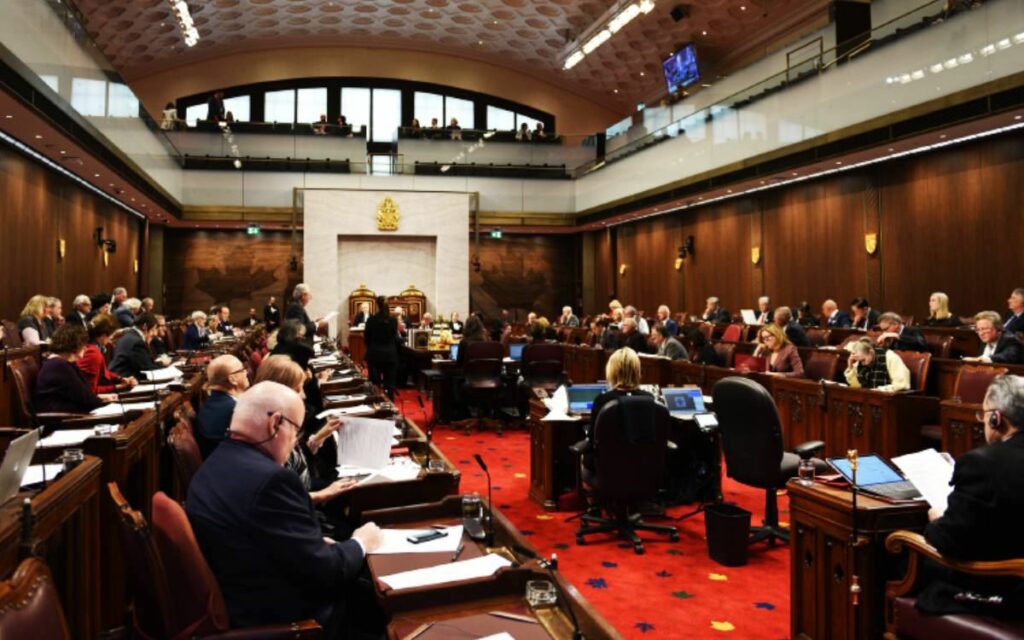
The reality is that many Canadians are struggling to make ends meet. Despite having some of the strongest social nets in North America to help those who need it, Canada’s current programs are failing to meet the nation’s needs. Photo Credit: Senate of Canada.
As many white-collar Canadians return to work today, the friendly question of “how were your holidays?” will be asked by co-workers across the country.
A friendly ice breaker to re-connect with co-workers is usually followed by a response like “it was good. I did x, y, and z. How was yours?” and then the day continues.
This year, it might be different. With Canada’s unemployment rate at 5.7 per cent and 50 per cent of Canadians now reporting they’re living paycheque to paycheque, many will be wrestling with uncomfortable truths.
The reality is that many Canadians are struggling to make ends meet. Despite having some of the strongest social nets in North America to help those who need it, Canada’s current programs are failing to meet the nation’s needs. There has been much debate about creating a universal basic income (UBI) to ensure that all Canadians are able to pay their bills and have a roof over their heads.
Currently, there are two bills before Parliament, one in the House of Commons and the other in the Senate, which are looking to establish the framework for a UBI program in Canada. The bill before the House, first introduced by the NDP in 2021, has all but stalled. The bill before the Senate is currently being examined by the Senate’s finance committee.
The idea of a UBI program is not a new one, with discussion dating back to the 1970s.
Under the leadership of former premier Kathleen Wynne, Ontario launched a pilot basic income program. However, it was swiftly cancelled by the Ford government upon election in 2018. Since then, renewed calls for basic income have emerged, particularly in the wake of the creation of the Canada Emergency Response Benefit (CERB) to help deal with the pandemic.
CERB was created to support Canadians out of work because of COVID and struggling to make ends meet. CERB paid hundreds of thousands of Canadians $2,000 a month to ensure that people had houses to live in, food in the fridge, and the electricity stayed on. Like many things the government does, people took advantage and CERB was no exception.
There were reports of citizens claiming CERB despite not being eligible. Other reports noted CERB payments were being used to make wagers on sports games or investments in the stock market. Instead of seeking summer employment or accepting fewer work hours, some young individuals opted for CERB.
Despite the drawbacks and misuse of CERB, the program showed that if there was interest, the federal government would be able to administer a national basic income. Though it would come at a very steep cost.
A Parliamentary Budget Officer (PBO) report released in 2021 noted that a UBI program that provided close to $17,000 per year to low-income Canadians would cut poverty in half. However, the PBO also noted the cost of such a program would be $85 billion a year, rising to $93 billion by 2026.
Canadian taxpayers are not the only ones feeling a pinch. The federal government is also under extreme pressure to cut costs and reduce spending. Given the high price tag, it is unlikely the current government will look to introduce a UBI program, despite the possible benefits.
The government has learned its lesson from CERB that handing out “free” money is not free at all. At some point, the money needs to be paid back. Meanwhile, Canadians are being left out in the cold with programs that failing to meet their needs.
UBI may not be the answer, but there must be something out there to give those that need a hand up and not just a handout.

Daniel Perry is a consultant with Summa Strategies Canada, one of the country’s leading public affairs firms. During the most recent federal election, he was a regular panelist on CBC’s Power and Politics and CTV Morning Ottawa.




















